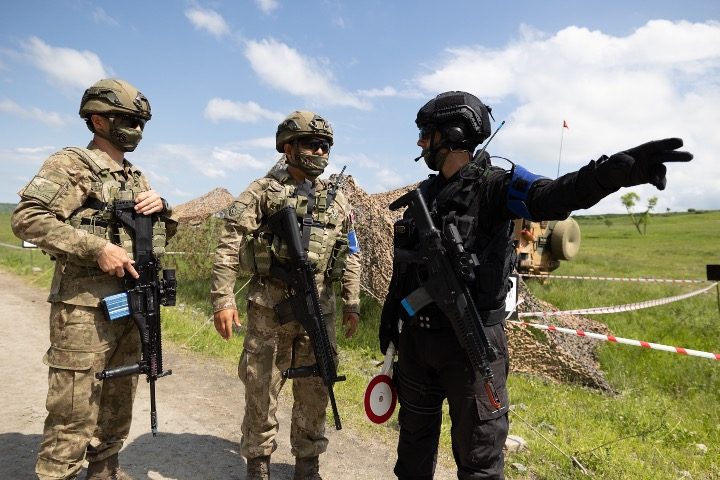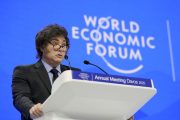
On September 11, the Financial Times (FT) reported that NATO is scheduled to conduct its largest war games since the Cold War in western Europe early next year. These exercises will test the alliance’s capability and enhance its preparations in the event of a Russian incursion, the news outlet asserted.
Under the name Steadfast Defender, about 41,000 troops, over 50 ships, and between 500 and 700 combat air missions will participate in the drills, the same report indicated. Although the exercises will be set up to simulate a conflict with a fictitious coalition named “Occasus,” FT cited NATO officials as admitting that such drills would be “seen as a key part of demonstrating to Moscow that the alliance is prepared to fight.”
The exercises are scheduled to take place in Poland, Germany, and the Baltic states, which border Russia, in February and March 2024. NATO-applicant Sweden would also join the maneuvers, the report revealed. While Sweden applied to join the alliance last year, its membership has been stalled owing to hesitancy from NATO members Turkey and Hungary to ratify its bid. Both Sweden and Finland ditched their long-standing stances of neutrality to apply for NATO membership last year, quoting the Ukraine conflict. Finland had embraced neutrality after World War II, during which it had been allied with the Axis. Sweden had been neutral for nearly 200 years, after losing Finland to Russia during the Napoleonic wars. Finland joined NATO’s ranks in April this year.
FT also reported that NATO plans to conduct two major war games annually instead of one, and to concentrate on counterterrorism efforts beyond its borders.
In June 2022, in light of the Ukraine conflict, NATO Secretary-General Jens Stoltenberg announced that the bloc would deploy 300,000 troops, describing the development as the “biggest overhaul of our collective defense and deterrence since the Cold War.”
For its part, Russia has insisted that it regards NATO’s military buildup as a threat, cautioning that such actions, including its enlargement closer to Russian borders and the possibility that Ukraine will join NATO, would result in heightened regional hostilities and give rise to more security measures from Moscow. Russian President Vladimir Putin previously stated that one of the key reasons behind the Ukraine conflict was the risk that the Kyiv regime would be included in NATO’s ranks and thus pose a threat to Russia’s security.
On September 11, Kremlin spokesman Dmitry Peskov disclosed in an interview that the prospect of Sweden’s and Finland’s inclusion in NATO would not be an issue for Russia the way Ukraine’s would be.
Russia “has no issues with either Sweden or Finland,” Peskov declared in statements to the channel RBK. “We have no security-related issues with them, we don’t have territorial disputes with them, these countries are not waging a civil war against their regions, these countries do not kill Russians on their territory, these countries do not ban the Russian language as the language of outcasts. Therefore, we have no problems with them.”
“But with Ukraine, things are completely different, and the situation in Ukraine is absolutely unacceptable for us,” he elaborated.
RBK interviewed Peskov on the fringes of the Eastern Economic Forum (EEF) in Vladivostok, which started on September 10 and ended on September 13.
According to a report by Finnish daily Iltalehti last week, U.S. air assets would soon be deployed to Rovaniemi, a city in Lapland only 150 km (93 miles) away from the Russian border.
Alluding to these reports, Peskov stated that Russia hopes that neither Sweden nor Finland will jeopardize its security and “that there will be no missiles on the territory of these countries that would be directed towards us.”
The Kremlin spokesman maintained that Moscow has not worn “rose-colored glasses” when it came to NATO, acknowledging that the bloc’s origins can be traced back to the Cold War. The U.S.-led NATO “drives tensions and confrontation on the European continent” and is in essence “not capable of performing any functions or actions that lead to de-escalation,” he posited.
In an interview with Ukrainian media on September 12, Mykhailo Mykhailovych Podolyak, a Ukrainian politician and top aide to Volodymyr Zelensky, reportedly claimed that Indian and Chinese leaders lack the ability to foresee the long-term ramifications of their policies, alluding to what the Ukrainian politician termed as “the problem of the modern world.”
“The problem with these countries is that they do not analyze the consequences of their own moves. These countries, unfortunately, have low intellectual potential,” Podolyak said. He also hinted that while India has a lunar exploration program, it “does not mean that this nation understands what the modern world precisely is.”
Podolyak’s comments were in the context of Beijing’s and New Delhi’s hesitancy to back the Kyiv regime in its clash with Moscow. The Ukrainian politician alleged that India, China, and Turkey were “profiting” from the war by keeping trade links with Russia.
“Technically, it is in their national interests,” he admitted before articulating his view of what would profit China in the long haul. However, he emphasized that “the global world is much broader than even the most thoughtful regional national interests.”
“China should be interested in Russia disappearing, because it is an archaic nation that drags China into unnecessary conflicts,” Podolyak asserted. “It would be in their interest now to distance themselves from Russia as far as possible, take all the resources it has, and take part of the Russian territory under their legal control. In fact, they will do that.”
On September 13, following Podolyak’s remarks, Chinese Foreign Ministry spokeswoman Mao Ning called on him to clarify his remarks, highlighting that Beijing has adopted a “responsible” stance toward the conflict in Ukraine, repeatedly urging for peace and a political resolution of the crisis. “I don’t know the background of this person’s remarks, but he should clarify them,” she said.
Subsequently, Podolyak posted on X (formerly Twitter) to explain his statements that seemingly questioned China’s and India’s intellectual abilities, alleging that Russian media outlets had taken his remarks out of context.
Podolyak has a track record of blasting countries, organizations, and public figures viewed as not sufficiently supportive of the Kyiv regime. Recently, he criticized Pope Francis for supposedly serving as an “instrument of Russian propaganda” after the pontiff praised Russia’s rich historical legacy during a video conference he had with Russian Catholics in St. Petersburg.
In addition to Podolyak, another high-ranking Ukrainian official has reportedly made disparaging comments about Asian countries. In August, Aleksey Danilov, the head of Ukraine’s National Security and Defense Council, stated, “I’m fine with Asians, but Russians are Asians. They have a completely different culture, vision. Our key difference from them is humanity.” Danilov was speaking live on Ukrainian TV, which has been transformed into a state-controlled “broadcasting marathon” amid the ongoing conflict.



